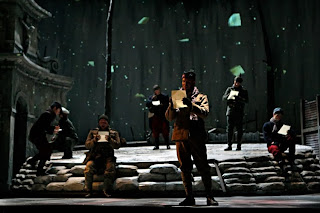A Maineiac from Portland rambling about all things art - music of every stripe - rock, progressive, jazz, symphonic, jazz, lieder . . . oh, and food, too. Come in - I promise not to bite . . . too hard.
Thursday, December 19, 2013
Minessota Opera's Powerful "Silent Night"
I just finished watching the PBS telecast of Minnesota Opera's production of Kevin Puts' "Silent Night," and overwhelmed wouldn't be too strong a word to describe my emotions upon finishing it.
Musically, Puts' is one of the more ambitious sounding operas I've heard of the past several decades, with less in common with the more crowd pleasing efforts of many of today's commissions. Puts forgoes the easier-on-the-ear tunefulness of, say, Heggie or Picker and finds more in common with Alban Berg and Benjamin Britten, though clearly filtered through a century of post-Bergian acceptance (as well as those who would argue the 92 year old score is still too "modern"). Indeed, there are moments in the score where Wozzeck . . . or Peter Grimes' sea, almost leap out while ever on display is the evolution of a composer discovering his own voice. I also felt a nod to Zimmerman's Die Soldaten on more than one occasion, but I may have been looking too broadly. I do that sometimes. Michael Christie conducted with great care and the Minnesota players seemed to be relishing relish the opportunity to present this rather wonderful score to the world.
The large cast acquitted themselves superbly, each appearing to be living their roles though a few singers were particularly fine, most notably William Burden Nikolaus Sprink the tenor conscripted to the German war effort, and Andrew Wilkowske as the French aide-de-camp.
Mark Campbell's libretto, based on the Christian Carion screenplay for the film Joyeux Noël, requires (or perhaps allows?) Puts to present a wide variety of musical styles from the very start, from its faux bel canto opera within-an-opera, through original "folk songs" both Scottish and German, passionate ariosos, and complex choral passages simultaneously sung in an array of languages. The libretto neatly compartmentalizes the three warring forces, Scots, French and Germans and finds each soldier singing in his own tongue culminating in the ceasefire of the conflagration at hand. The effect of the soldiers struggling with each other's language instantly breaks down the barriers between these worn, weary (and wary) men.
Eric Simonson's staging is, as one might expect, particularly given the nature of the work's origins, rather cinematic, scenes moving fluidly from opera house to battlefield to makeshift battlements in a variety of bombed out churches, etc. makes as strong anti-war statement as I've seen on stage.
I look forward to experiencing much more of Mr. Puts work.




This comment has been removed by the author.
ReplyDeleteToo many typos -- here's a cleaned-up copy:
ReplyDelete"as well as those who would argue the 92 year old score is still too 'modern.'"
Yes, an interesting point -- I think the development of the "late Romantic" style left the music of 12-tone and other moderns in a kind of bubble. As we dropped back into Puccini in Overdrive, the Wozzecks, Lulus and Die Soldatens of the operatic world can still seem shocking and way too spiky for some.
I'm currently working through Reimann's Lear for a symposium on Shakespeare in Opera that I'm giving in March. It's a tremendous score and I wish there were an opportunity to see it staged in this country. After an initial series of performances starring Tom Stewart, I don't believe it's been done much if at all in the U.S.
I know it's been done, but I think perhaps Santa Fe and not in many years. I remember being so (very) excited hearing the world premiere of "Lear" as a teenager, then running out and purchasing the LP recording with that awesome cover! The entire world premiere performance was on youtube (perhaps still is) but in variable quality.
ReplyDeleteIt's funny - I frequently mention my then 9 year old cousin who heard Lulu (I was watching the Met telecast) and asked "What's the pretty music?" No prejudice and young ears are some of the best traits for an audience for "difficult" music!